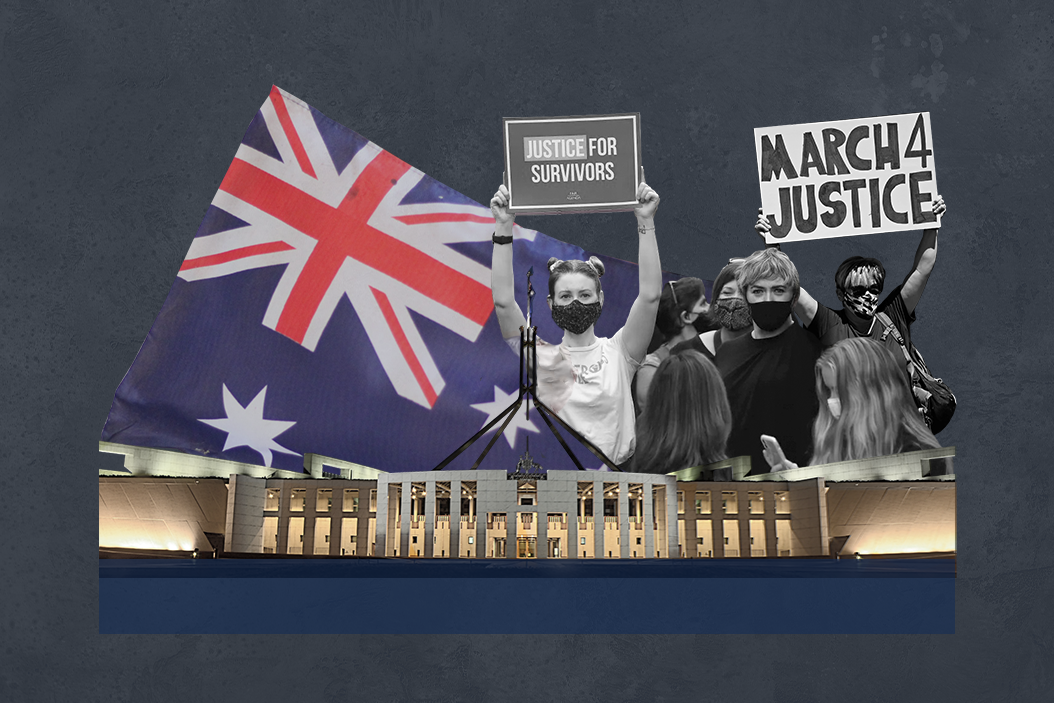In recent months, Australians have grown accustomed to stories of sexual impropriety by their politicians dominating the news headlines. Instances of groping, rape, and even a man masturbating on a female colleague's desk at Parliament House have become so ubiquitous that Prime Minister Scott Morrison called this week for a "shake-up" to address systemic sexism in Australian politics.
But what are the proposals currently dominating the political conversation, and where might they lead?
Backstory. For years, Australian women working in politics have described Canberra as an "Old Boys' Club" that prevents women from progressing up the leadership ladder. Over the past few years, several high-profile female politicians across the political aisle resigned from their posts, citing pervasive gender-based bullying in Canberra.
Now, that conversation is in overdrive. Last month, a former female staffer, Brittany Higgins, alleged that she had been raped by a colleague in the office of their former boss Linda Reynolds, a senior government minister. (It's been reported that Reynolds referred to the alleged-victim as a "lying cow" when she came forward.) Moreover, details of a historic rape allegation against now-former Attorney General Christian Porter were also recently revealed.
Baby steps. Morrison has been widely criticized for his tone-deaf and callous response: He initially refused to back a formal investigation into the allegations, arguing that if we are to do so, "we are eroding the very principles of the rule of law."
The PM has changed his tune in recent days as the political crisis facing his conservative Liberal Party deepens. Morrison reshuffled his cabinet this week, demoting both Reynolds and Porter. But the PM provoked more protest when he referred to Marise Payne, the foreign minister and minister for women, as "effectively the prime minister for women," further stoking the flames of female grievance: "Aren't you the women's prime minister? Aren't you not fit to do the job of prime minister?" one journalist asked.
Growing call for quotas. The political maelstrom has given rise to mounting calls for the Liberal Party to adopt a quota system to boost female representation in parliament. Morrison, for his part, has remained tentative.
In fact, the issue of gender quotas in politics resonates far beyond Australia. So, what are the best arguments for quotas?
Quotas work. Proponents argue that women make up more than half of the Australian population, and that changing the Liberal Party's rules is needed to ensure gender-equality legislation is passed. In Finland, for example, national legislation includes a quota provision that requires 40 percent male and female representation in national and municipal decision-making bodies. As a result, Finland leads the world in family-friendly workplace policies (consider that 90 percent of Finnish companies offer flexible-working options).
A solution for cultural change. The Australian Labor Party, the main opposition, introduced various quotas for women starting in the mid-1990s. As a result, its federal caucus is represented by almost 50 percent women, compared to just 23 percent for the ruling Liberal Party. It's no wonder, proponents of quotas argue, that most (if not all) of the lewd behavior in Canberra has been linked to the Liberal government. Uprooting structural and attitudinal biases that subjugate women in politics can only happen, they say, if more women are in positions of power.
But many people aren't sold on quotas.
Tokenism isn't empowering. Some women's rights activists say that a quota system is infantilizing, and has the unintended effect of demeaning rather than empowering women. (Opponents argue, however, that a "whatever-it-takes approach" is crucial to sowing the seeds for long-term change.)
What about the meritocracy? Quota critics also say that people should be elected to serve in parliament based on expertise and merit, not because of their gender. Equality of opportunity means that everyone should be on a level playing field.
Grassroots party structure should prioritize the best candidates. Critics argue that as part of Australia's preselection process — where candidates are chosen by party members to run for specific electoral seats — the best candidate for each district should be chosen without a gender condition attached. (However, advocates for electoral quotas argue that's precisely the way to address the problem, pointing to the progress made by the UK's Conservative Party, which has almost quadrupled its female representation since 2005, when it revised its preselection process and started taking proactive steps to boost female involvement.)
Contemplating her time in Canberra over two decades, Australia's former foreign minister Julie Bishop concluded: "It is evident that there is an acceptance of a level of behavior in Canberra that would not be tolerated in any other workplace in Australia."
But are quotas the way to solve the problem? Are there better ideas?
